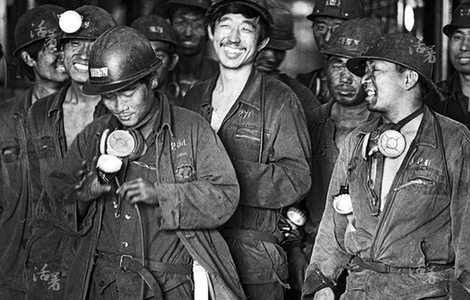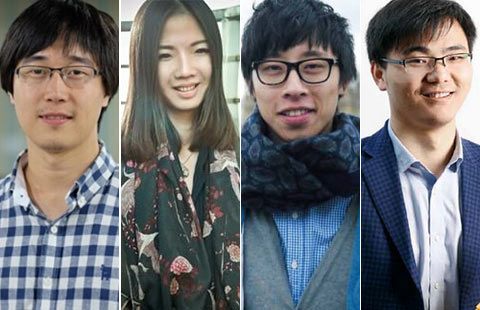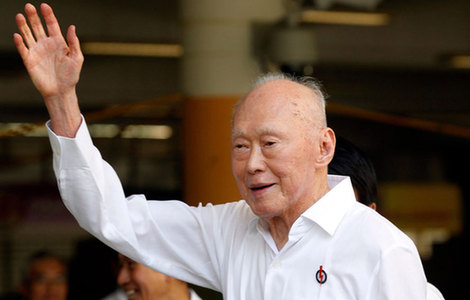'It's time to free up the yuan'
Updated: 2015-03-23 07:16
By CHEN JIA(China Daily)
|
||||||||
Policies will be ready this year to support overseas investment
 |
|
Zhou Xiaochuan, governor of the People's Bank of China, meets IMF Managing Director Christine Lagarde at the China Development Forum in Beijing, March 22, 2015. [FENG YONGBIN/CHINA DAILY] |
The governor of the People's Bank of China released a time schedule on Sunday to make the country's currency more user-friendly as a step toward making international investments easier.
The reform aims to meet the International Monetary Fund's requirements before its evaluation on whether the yuan could be a part of Special Drawing Rights.
This means the yuan would join the US dollar, euro, pounds sterling and Japanese yen as part of the supplementary foreign exchange reserve maintained by the IMF.
"By the end of 2015, the last year of the 12th Five-Year Plan (2011-15), China plans to make the renminbi capital account convertible," said PBOC Governor Zhou Xiaochuan when he met chief executive officers from the world's top business groups at the China Development Forum in Beijing on Sunday.
Zhou said: "It is time to change the current policy that restrains Chinese individual residents from buying equity and financial products in overseas markets. Also the Qualified Foreign Institutional Investors plan is not flexible enough to satisfy foreign residents' investment needs on the mainland.
"A set of pilot policies and regulations will be released this year, to basically achieve the requirements for a currency that can be used more easily."
Asked whether the speculation that he may retire soon was true, Zhou answered: "I have no further information and view on this question, and we need to wait and see."
The IMF will make a regular review of the renminbi in the SDR basket later this year. The selection of currencies for that is based on two main criteria: the size of a country's exports and whether its currency is freely usable.
For personal use, residents in the mainland can at most convert renminbi for $50,000 or other currencies equal to that every year. More regulations come into play when they intend to invest into overseas equity markets.
Zhou said: "The government is working on a draft to modify current foreign exchange regulations."
IMF Managing Director Christine Lagarde told the meeting: "The IMF welcomes progress and achievement in the Chinese economy and financial market reforms."
She agreed that the measures outlined by Zhou could lead to the internationalization of the renminbi and liberalization of the capital account.
"The IMF will work constructively with China, and consider accepting the renminbi into the SDR basket if it can fulfill the conditions," she added.
But she also warned: "Emerging economies should prepare for unexpected cross-border capital flows when the main economies change their monetary policy.
"The central banks need to react quickly when the global policy environment changes suddenly, by increasing market liquidity and strengthening intervention on the foreign exchange rate to curb capital flights."
Yu Yongding, an academic at the Chinese Academy of Social Sciences, said that more discussion is needed to decide whether joining the SDR is a good or bad thing for the renminbi.
"I would prefer to open the capital account at a slower pace as we need to do more to improve the financial system first," Yu said.

 Stairway to heaven
Stairway to heaven
 Dramatic changes for Chinese miners in the last 30 years
Dramatic changes for Chinese miners in the last 30 years
 Antitrust policy 'treats all fairly'
Antitrust policy 'treats all fairly'
 Top 10 young Chinese entrepreneurs defining the future
Top 10 young Chinese entrepreneurs defining the future
 Singapore Embassy in Beijing mourns Lee Kuan Yew
Singapore Embassy in Beijing mourns Lee Kuan Yew
 China joins legendary flower show
China joins legendary flower show
 Monks perform tea-picking ritual in Hangzhou
Monks perform tea-picking ritual in Hangzhou
 Singapore founding father Lee Kuan Yew
Singapore founding father Lee Kuan Yew
Most Viewed
Editor's Picks

|

|

|

|

|

|
Today's Top News
Kites of Asia soar at Smithsonian
Beijing artist gives back to opera
Lee remembered as 'old friend' of Chinese people
Texas Republican Cruz announces presidential bid
Fictional TV presidents more popular than Obama - poll
Funding of China-backed bank will be open to other countries
Six Western economies apply to join AIIB
US urged to honor pledge
US Weekly

|

|








